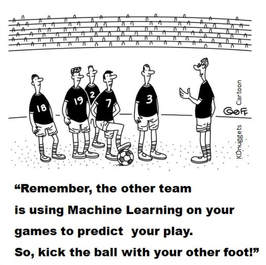 Every four years, football is omnipresent as national teams compete in the world championship. Like it or not, football is a global obsession on the one hand and big business on the other hand. About a year ago, we first talked about the datafication of football. Data nowadays is used not only used to optimize the performance of players and teams but also to predict the results of football matches and whole tournaments. In our last football related post, we already mentioned Martin Eastwoods presentation from 2014 in which he discussed the application of a Poisson regression model with an adjustment inspired by the 1997 paper by Dixon and Coles published in the Journal of the Royal Statistical Society. Another interesting blog post applying a linear model on Premier league data is from David Sheehan. It is not surprising that many data scientists made an effort to set up prediction models for the coming football world champion that is currently searched for in Russia. Ritchie King, Allison McCann and Matthew Conlen already tried to predict the 2014 world champion (ok, Brazil did not finally make it ...) on fivethirtyeight.com, the site founded by Nate Silver (well known for predicting baseball and election results). Two interesting approaches we found for the current World Cup in Russia use the same data set from kaggle.com containing international football results from 1872 to 2017. While Gerald Muriuki applies a logistic regression model and comes up with Brazil as next world champion, Estefany Torres applies decision trees and predicts Spain to win the tournament. Torres additionally included data on individual player performance and market value in her analysis. James Le took an even closer look at individual player data and investigated the optimal line up for some of the high profile teams in the tournament. We particularly liked the descriptive analyses of the Fifa18 player dataset. Le’s personal prediction is France by the way. We also came across a post on KDnuggets that mentions additional data sources (FIFA world rankings, Elo ratings, TransferMarkt team value and betting odds). The prediction model there – our Northern neighbours might be happy to hear that – sees Germany beating Brazil in the final. We will see on July 15th ... and wish you nice summer days / holidays in the meantime. Read you soon!
1 Comment
12/29/2023 05:16:32 am
How do both models assess their predictive performance? Are there specific metrics or methods used to validate the accuracy of predictions? Visit Us <a href="https://sas.telkomuniversity.ac.id/en/">Telkom University</a>
Reply
Leave a Reply. |
Categories
All
Archive
June 2024
|